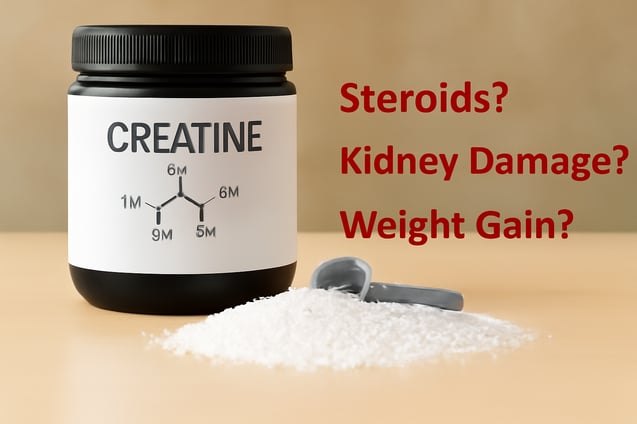Creatine Myths Busted
Creatine is one of the most researched and widely used supplements in the fitness world. It’s a go-to for athletes, bodybuilders, and gym-goers looking to boost strength, power, and muscle growth. But despite its popularity, creatine still faces a lot of misinformation. Some say it's dangerous, while others swear by its benefits. So what’s the truth?
CREATINE
4/4/20252 min read
Is Creatine Safe? Myths vs. Facts
Creatine is one of the most popular supplements among athletes, bodybuilders, and fitness enthusiasts alike. Despite its proven benefits in enhancing athletic performance and muscle growth, myths surrounding its safety and usage persist. In this article, we’ll separate myths from facts and answer the crucial question: Is creatine safe?
Myth 1: Creatine Harms Your Kidneys
Fact: Numerous studies have demonstrated that creatine supplementation in healthy individuals with no pre-existing kidney issues is safe. Concerns about kidney damage primarily arose because creatinine—a waste product of creatine—is filtered through the kidneys. However, research consistently shows no adverse effects when creatine is used appropriately.
Myth 2: Creatine Causes Dehydration and Cramping
Fact: While creatine does draw water into your muscles, this does not lead to dehydration or increased risk of cramping if proper hydration is maintained. In fact, studies have indicated that creatine supplementation might even reduce the likelihood of cramps and muscle injuries when paired with sufficient hydration.
Myth 3: Creatine is Only Beneficial for Bodybuilders
Fact: Creatine isn’t just for bodybuilders. Its benefits extend to anyone engaging in high-intensity exercise, including athletes, runners, and those in general fitness routines. Creatine enhances ATP production, the primary energy source used during short, intense bouts of exercise, thereby benefiting a broad range of physical activities.
Myth 4: Creatine Causes Weight Gain
Fact: It’s true that creatine supplementation often results in initial weight gain, typically due to increased water retention in muscles. However, this isn’t "fat gain" but rather a sign of effective creatine absorption. Over time, creatine helps support muscle growth, which can contribute to healthy, lean muscle gains rather than unwanted body fat.
Myth 5: Creatine is Unsafe for Teenagers
Fact: Research indicates that creatine, when used responsibly and in proper dosages, is generally safe for teenagers. In fact, creatine is often beneficial in supporting athletic performance and muscular development during teenage years, though consultation with a healthcare professional is recommended for younger users.
Safe Use of Creatine
To ensure safety and effectiveness:
Stick to recommended dosages (typically 3–5 grams daily).
Stay adequately hydrated.
Avoid unnecessary loading phases unless specifically directed by a fitness professional.
Choose quality products from reputable brands.
Conclusion
Creatine is widely researched and overwhelmingly considered safe for most healthy individuals when used appropriately. Dispelling common myths helps users make informed decisions and reap the full benefits of this powerful supplement. As always, individual health considerations may vary, so consulting with a healthcare professional is advisable if you have specific health conditions or concerns.


© 2025. All rights reserved.
